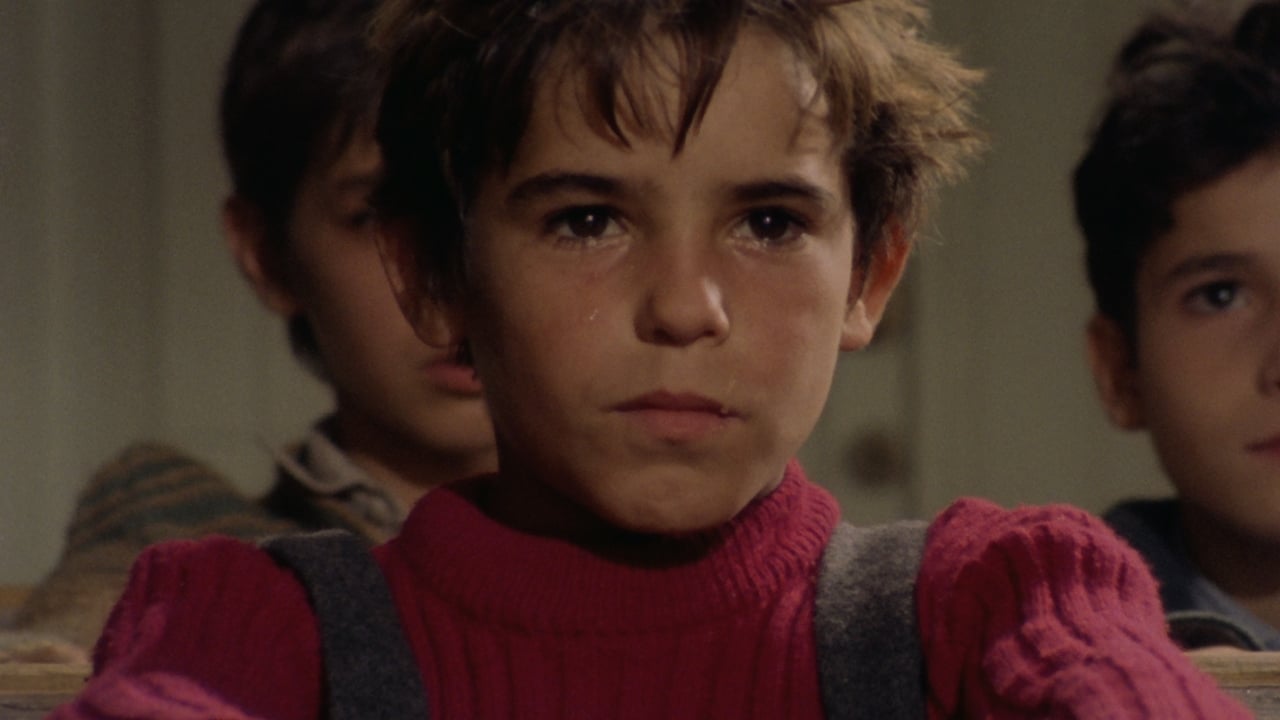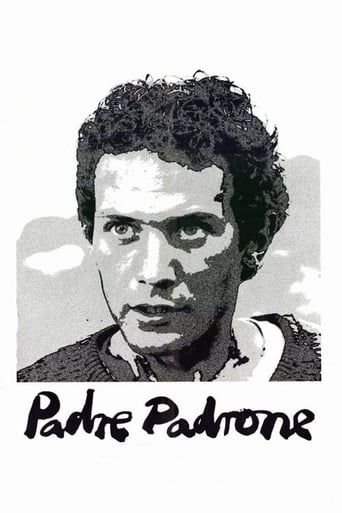ManiakJiggy
This is How Movies Should Be Made
Supelice
Dreadfully Boring
Catangro
After playing with our expectations, this turns out to be a very different sort of film.
Winifred
The movie is made so realistic it has a lot of that WoW feeling at the right moments and never tooo over the top. the suspense is done so well and the emotion is felt. Very well put together with the music and all.
Turfseer
'Padre Padrone' is based on noted linguist Gavino Ledda's autobiography which came out in 1975. The distinguished directors, the Taviani brothers, brought the story to the screen two years later. Ledda chronicles his childhood, adolescence and young adulthood, growing up under the yoke of his tyrannical father, a sheep herder from Sardinia.'Padre Pardone' opens with a cameo from the real-life Gavino introducing the story directly to the audience. He brings us back to the time when he was in elementary school, when his father suddenly appeared one day and pulled him out of class for good. The father brings him to an isolated area in Sardinia with the intent of molding the very young child into a sheep herder. The child is forced to watch the property in an isolated area, Baddevrùstana, while his father is off tending to business in Siligo, a provincial town close by. Since the only means of travel is by mule, Gavino finds himself alone on inhospitable turf.Gavino tries to make contact with other children who are forced to work for their fathers in the same way and he ends up being punished for it. The corporal punishment includes beatings with spiny tree branches which is mentioned in the autobiography. In the film it's not as clear, as we see the beatings with the branches from a distance. We do see a scene in the film where the father goes a little too far, where it appears Gavino loses consciousness for a short while (the father brings the son a cup of water to revive him).In another memorable scene, Gavino buys a broken accordion from two passersby and pays them with two sheep. Gavino lies to his father that he was attacked by bandits who stole the sheep. He shows his father his (self-inflicted) cut on the mouth but the father doesn't buy his story and cuts his rations.Due to the isolation of the male children as their fathers force them to work the entire time tending to the sheep, they have little or no contact with the opposite sex and develop some rather unhealthy sexual proclivities. A few scenes of bestiality are prominent during the first third of the film, including Gavino getting it on a with a mule and a group of boys masturbating with the aid of chickens they're attending to inside a coop.Once Gavino grows up, we meet him next when he's twenty. Gavino's father somehow inherits an olive grove under dubious circumstances. After a landowner is killed by a rival, Gavino's family helps the widow with the funeral arrangements and disposing of the property. The widow, in fear for her life, decides to move away from the area, but gives Gavino's father the olive grove as compensation for their help. Gavino's father plans to cede the grove to his offspring following his death but a frost destroys all the orchards in the area, including the family's olive grove.Gavino's father then decides to sell his herd and all this property, except for a garden. The children are shipped off as laborers but the father ships Gavino off to the Army. Before he leaves, the father teaches him some rudimentary math and reading so he can be accepted into the Army, as they will not accept someone who is completely illiterate.While in the Army, with the help of a friend, Gavino eventually learns how to read and write. He also completes a course in electronics and learns how to assemble a radio. When his enlistment period is over, against his father's wishes, he quits the army and decides to enroll at the University of Sardinia to study linguistics. Gavino's father forces him to work long hours in the garden which interferes with his studies and eventually the two have a physical confrontation. Now much stronger than his father, Gavino wrestles him down to the ground and humiliates the old man. Gavino concludes it's best that he leave his father's home and then goes off to the university to later become a distinguished professor of linguistics.It should be noted that the Taviani brothers are not out to condemn the brutality of the patriarchal society they're examining. While Gavino's father is sometimes brutal, in his eyes, he still has Gavino's best interests at heart. A good deal of the father's behavior toward his son is more 'tough love' than continuing acts of sadism. In many ways, he's ambivalent toward Gavino. In a most telling scene at the end, Gavino is looking for his valise under his father's bed, who's sitting right there after being humiliated after their wrestling match. As Gavino looks under the bed, the father is about to gently stroke his son's head but then clenches his fist, as if to strike him. In the denouement, we see that there were no further physical confrontations.Not everything in 'Padre Padrone' works. Most notably, none of the other family members are developed as fleshed-out characters. The sound quality of the film is also quite poor, as if we were listening to dialogue dubbed in the studio. Questionable experimental techniques are also utilized including animal and child voice-overs and sub-titles that seem to come out of the blue.'Padre Padrone' is comprised of a series of interesting vignettes about a world most of us are not familiar with. While the father may seem a bit one-note, the intensity between father and son is absorbing. 'Padre Padrone' can sometimes be infuriatingly slow-moving but one finds oneself waiting to find out how the relationship between the father and son is resolved. I'm not sure if this film is a true 'classic', but it's worth a look at least once, if not twice.
el_master
Seeing this film, reminded me of the typical situation of living outside the cities and in the fields.Gavino Ledda, lived a difficult life, which, the worst part, I think, was being isolated and with no contact from the outside of his sardinian life.I've seen that this movie is a polemic one towards being a good film or being a piece of trash, I'd go with the first one. I think that is a good film, making an adaptation of a book is always difficult, and the taviani brothers, did it succesfuly, ok, it is not a masterpiece either. but it's not a bad film, it applies the best it could to the low-budget they had. The Feat comes with the fact that it won the Palm D'Or in Cannes in 1977, and sometimes you might expect a piece of art, comparing it to the 'Tree of Wooden Clogs' that won the next Palm D'Or in 1978, Padre Padrone stands weak, but still I think it's a good movie, I own it, and sometimes watch again to take on some technichal details. If you have the chance see it, I can assure you that even if you don't like it, you won't consider it such a waste of time.
Ralph_Wiggum
This film was laughably bad. The adults in the film are all brutish savages, and the plot line was non-existent. Apparently, a kid is pulled out of school to work for his father as a sheep herder, and suffers abuse at the hands of the man (who, judging from the film, couldn't have had an IQ much higher than 3). The next thing you know, the kid is about 18 and is still trying to figure out a way to run off. Horribly acted and, unlike movies of the same genre (Acla) this film was so pathetically scripted that you couldn't even care about the characters. A complete and utter zero.If you're looking for a "Mystery Science Theater" type experience where you can sit around with some of your buds and laugh at a truly horrible movie, then 'Padre Padrone' is the one for you!
mifunesamurai
The life of an Italian peasant who was forced out of school by his father so as to be a shepherd in the remote country side. The loneliness and the father's brutality has an effect on the boy who grows up to be a late learner in reading and writing. This new knowledge he uses as a weapon against the everlasting battle with his tyrant father. The first half drags on but the second half all comes together.

